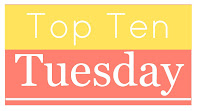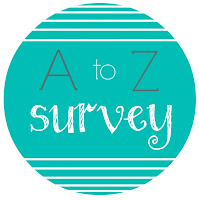Hi, Readers!

This Tuesday,
The Broke and the Bookish blog challenged readers to write a list of their Top Ten Book Turn-Offs. Usually, I post about books that I enjoy reading and what makes them good. This post is a bit different: I am writing about what I
can't stand when reading. It was easier to create this list than I expected, which is weird because I like almost every single book that I lay eyes on. The books that I mention in this post are not necessarily bad, but they do have certain aspects that really get on my nerves. Click on a title for more information about it on Amazon Books or to one of my book reviews if applicable.
1. Dual narration

Books that are told by multiple characters flat-out confuse me. Even when the author switches between fonts to distinguish the narrators, it is still hard to follow who is telling the story. Occasionally, certain authors are able to pull off the difficult writing style, such as Marie Lu in
Legend. Other authors tend to transition awkwardly between scenes or branch into two separate plot lines.
Sorry, James Patterson... but
Witch and Wizard would have been so much better if only one of the two siblings was the narrator.
2. Boy-crazy female narrators

I love reading books that have strong female protagonists. Look at Katniss Everdeen, Hermione Granger, and Tris Prior. One of the best aspects of these teens is that they are able to balance their crazy adventures with their love lives. When a female narrator relies too much on Prince Charming to help solve all of her drama, the novel immediately turns sour.
Sorry, Stephenie Meyer... but Bella Swan from
Twilight was a tad bit too boy crazy to handle, and she relied on vampires and werewolves to do the dirty work for her. Just pick Jacob and forget about Edward. Problem solved. Go, Team Jacob!
3. Sequels

Has anybody else noticed that pretty much every single book that has been published in the last two years is the first of a series? I thought so. It's crazy that no author is able to create characters and formulate a plot line in
one book. So many of the books that I read lead to sequels. I lose track and forget about them until a few years later, and at that point, I don't remember what the books were about in the first place. My message to authors is to quit while you're ahead.
Sorry, Lois Lowry... but why can't
The Giver be a stand-alone novel? Three other linked stories just make the original seem cheap.
4. Pictures in chapter books
The key word in Young Adult Books is
adult. It's not Young Tween Books. Adult. That means the days of picture books are over and done. Aside from being childish, unnecessary, and wasting precious page space, pictures can tint the images of characters in the reader's mind. It is always fun to imagine how characters would look, so illustrators should not have to do it for us.
Sorry, Brandon Mull... but
Fablehaven did not need those illustrations. I really love the series and it is one of my all-time favorites, but come on! Pictures were not necessary.
5. Mentions of technology
One of the absolute best parts of Harry Potter is that J.K. Rowling abstained from mentioning technology in the wizarding world. She realized that bringing up technology would add a cheap tone to the books and allow them to become quickly outdated. Books that mention the new iPhone go out of date just as quickly as did the ones filled with cassettes, VHS tapes, and CDs. There is no chance that a book will
ever be considered a classic if it mentions technology because readers in a few years will have no idea what the author is talking about.
Sorry, Rachel Harris, but
My Super Sweet Sixteenth Century did not have to repeatedly mention that Cat Crawford uses an iPhone. Sometimes specific details are not a good thing.
6. Time jumps/Flashbacks
Similar to duel narration, time jumps and flashbacks are not always successful in Young Adult literature. Most of the time, they just get on my nerves and confuse me about what is going on. Time jumps into the future are the worst because they prove that the main character survives their adventure. There goes all of the suspense.
Sorry, Karen Healey... but
When We Wake's pointless and unnecessary time jumps into the future did not add to the story line in the slightest. The changes in time actually gave away silly things, like the fact that Tegan Oglietti manages to escape her enemies.
7. Cheating in relationships
This may seem cliche, but I like it when books end with a Happily Ever After moment. The girl and the guy should end up together. That's just how books work. They make you feel good about the world. Therefore, when there is cheating involved in a relationship and it is doomed to fail, I feel sad as a reader. The only time that cheating should be allowed in books is if that is the main subject.
Sorry, Lindsey Leavitt... but
Going Vintage would have been so much better if Mallory had gone vintage without being cheated on by her scummy boyfriend. I enjoyed reading this book and even included it in a
Back-to-School Books post, but sometimes I wonder if Mallory would have still had her adventure if she was not going through a break-up.
8. When the main character is not the same gender as the author
No matter how much we try, girls cannot understand the minds of boys, and visa versa. Authors should not even bother to try what the entire world has failed at. If I read a book that is about a male character but is written by a female author, I can immediately tell because the boy does not sound realistic.
Exception: Uglies, by Scott Westerfeld. Kudos for capturing the workings of the female mind. Scott Westerfeld completely understands the distinction of being "pretty", and creates a series filled with completely relatable but futuristic content.
9. End of a good series (*Spoiler Alert*)
Although I said before in #3 that I don't like sequels, I still love certain series. The end of
Harry Potter and the Deathly Hallows made me want to cry. Harry and Ginny, Ron and Hermione, their kids going to Hogwarts... picture perfect.
Sorry, Suzanne Collins... but sending Gale away to work for the rebels at the end of
Mockingjay is not a solution. Katniss should have had to work things out between Gale and Peeta, like the strong woman that she had become. She got an easy pass.
10. Grammatical errors
Grammatical errors are my biggest pet peeve! I assume that at least a few people proof-read books before they are put into print and sold around the entire world. How is it possible to misspell a word or to forget a comma when you know that millions of people will read your book and notice every mistake?
Sorry, Martin Leicht and Isla Neal... but I noticed that there was a wrong verb tense on the FIRST PAGE of
Mothership. It should be "was", not "were". Check out the error that I found by clicking
here and going to "Look inside". Although I really couldn't get over the verb tense issue, I did enjoy the book as a whole. See my complete book review
here.
Clearly, I am a pretty picky reader. The list of the ten book turn-offs above is just a fraction of what gets on my nerves when I am reading. Why so picky, you ask? Because I have read certain works of literature (*cough* Harry Potter *cough*) that are exceptional and have not enraged, angered, annoyed, or frustrated me in any way. Feel free to comment about your own personal book turn-offs below.
Happy Reading!


